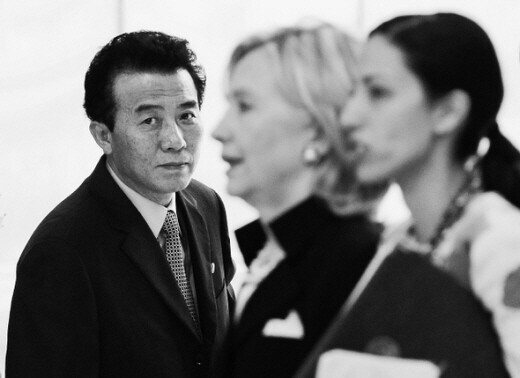hankyoreh
Links to other country sites 다른 나라 사이트 링크
U.S. unlikely to enact direct financial sanctions on N.Korea

By Lee Jae-hoon
Within two weeks, the White House reportedly rules out plans to designate and freeze specific bank accounts with links to North Korean.
A high-ranking diplomatic source familiar with the inner workings of the U.S. government said Friday that, as he understands the situation, the White House, rather than linking all North Korean bank accounts together, was considering a plan that would place specific North Korean companies and institutions on the sanctions list and prevent financial institutions around the world from dealing with them.
A different high-ranking official also said the United States would not concretely reveal that it was going after specific accounts.
This means the additional U.S. sanctions would not include direct financial sanctions such as those leveled against the Banco Delta Asia (BDA).
The sanctions leveled against the BDA began in September 2005, when the U.S. Treasury Department provisionally designated the Macao-based BDA to be a “primary money laundering concern.” This caused a run on the bank, and in order to prevent bankruptcy, BDA froze accounts, including North Korea’s $250 million in funds. Although not a proportionally large amount of money, it became highly problematic because it froze 52 institutional and personal accounts related to the Korean Workers Party, military leadership and government, the axis of power in North Korea.
Without any options, North Korea’s displeasure was such that its six-party talks chief negotiator, Kim Kye-gwan, cried that it was as if North Korea’s blood was running dry. In October 2006, North Korea protested strongly to the BDA measure with its second nuclear test. The problem was resolved through bilateral North Korea-U.S. talks in March 2007, but sending the frozen $250 million back to North Korea proved so difficult that the U.S. Federal Reserve bank and the Central bank of Russia had to step in.
It appears the United States made several strategic considerations in moderating the pace of the new sanctions. Government officials have stated that BDA-style sanctions are “highly powerful sanctions” that could cause friction with China. Government officials also stated that the situation in North Korea, which is already under high-strength sanctions in accordance with U.N. Security Council resolutions 1718 and 1874, is quite different from then.
“BDA-style sanctions could cause an uncontrollable situation of confrontation,” said a diplomatic source in Washington. “The United States will try as much as possible to avoid clashing with China and will first review its options while monitoring the situation.”
This means that since many of North Korea’s overseas bank accounts are with Chinese banks, BDA-style sanctions could kick off US-China tensions.
Another high-ranking government official said North Korea, without any options, took a major hit when the sanctions on the BDA were leveled in 2005. Currently, however, North Korea has faced difficulties in legally opening and operating accounts at major banks around the world due to the U.N. Security Council resolutions, and has likely already taken some measures to avoid a hit.
Please direct questions or comments to [englishhani@hani.co.kr]
Editorial・opinion
![[Column] Has Korea, too, crossed the Rubicon on China? [Column] Has Korea, too, crossed the Rubicon on China?](https://flexible.img.hani.co.kr/flexible/normal/500/300/imgdb/original/2024/0419/9317135153409185.jpg) [Column] Has Korea, too, crossed the Rubicon on China?
[Column] Has Korea, too, crossed the Rubicon on China?![[Correspondent’s column] In Japan’s alliance with US, echoes of its past alliances with UK [Correspondent’s column] In Japan’s alliance with US, echoes of its past alliances with UK](https://flexible.img.hani.co.kr/flexible/normal/500/300/imgdb/original/2024/0419/2317135166563519.jpg) [Correspondent’s column] In Japan’s alliance with US, echoes of its past alliances with UK
[Correspondent’s column] In Japan’s alliance with US, echoes of its past alliances with UK- [Editorial] Does Yoon think the Korean public is wrong?
- [Editorial] As it bolsters its alliance with US, Japan must be accountable for past
- [Guest essay] Amending the Constitution is Yoon’s key to leaving office in public’s good graces
- [Editorial] 10 years on, lessons of Sewol tragedy must never be forgotten
- [Column] A death blow to Korea’s prosecutor politics
- [Correspondent’s column] The US and the end of Japanese pacifism
- [Guest essay] How Korea turned its trainee doctors into monsters
- [Guest essay] As someone who helped forge Seoul-Moscow ties, their status today troubles me
Most viewed articles
- 1[Column] The clock is ticking for Korea’s first lady
- 2Hong Se-hwa, voice for tolerance whose memoir of exile touched a chord, dies at 76
- 3After 2 months of delayed, denied medical care, Koreans worry worst may be yet to come
- 4[Column] Has Korea, too, crossed the Rubicon on China?
- 5US overtakes China as Korea’s top export market, prompting trade sanction jitters
- 6Samsung barricades office as unionized workers strike for better conditions
- 7[Correspondent’s column] In Japan’s alliance with US, echoes of its past alliances with UK
- 8All eyes on Xiaomi after it pulls off EV that Apple couldn’t
- 9[Correspondent’s column] The US and the end of Japanese pacifism
- 10[Guest essay] How Korea turned its trainee doctors into monsters